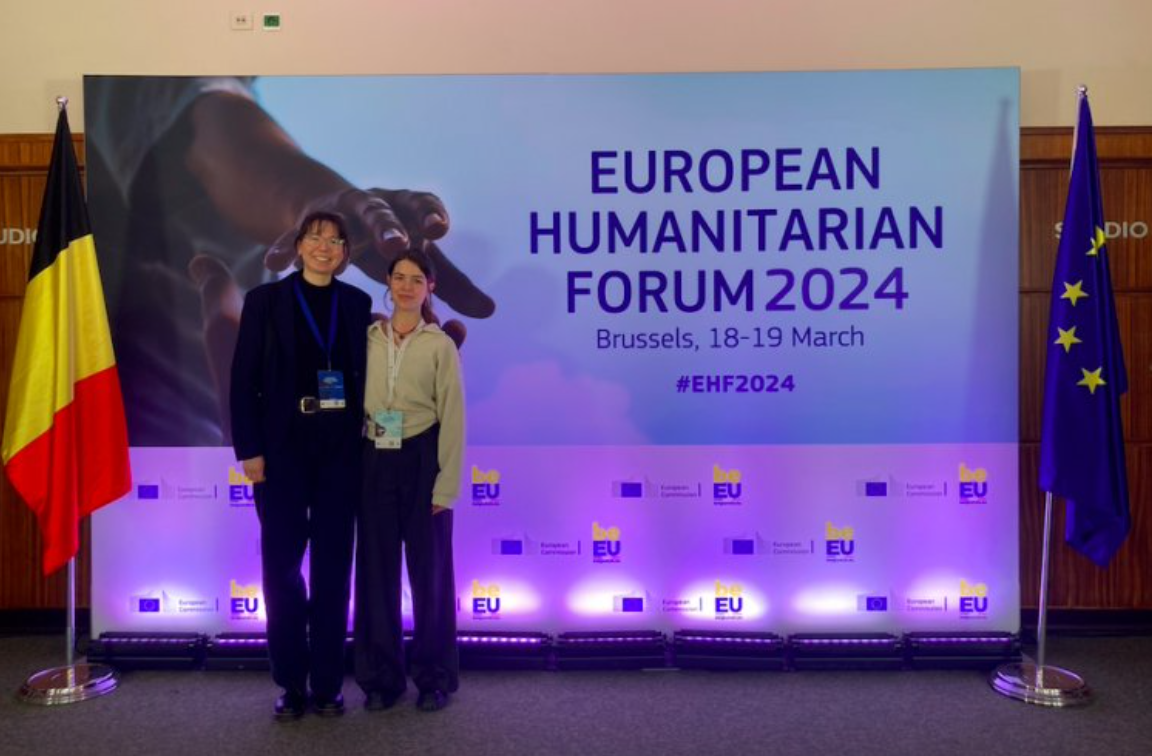- info@ghrd.org
- Mon-Fri: 10.00am - 06:00pm
European Humanitarian Forum 2024 Day 2

European Humanitarian Forum 2024 Day 2
20-03-2024
Written by Chiara Koop (EU Team)
Global Human Rights Defence
Media Coverage of Forgotten Crises: Maintaining a Strong Focus in a Competing Media Environment
To begin the second day of the 2024 European Humanitarian Forum, GHRD’s EU team members joined a panel discussion on the role of reporting and media in bringing attention and aid to crises in the modern day. The main question addressed was the debate whether media actually helps direct attention to crises, and whether this attention helps funding be invested. Key speakers such as Sofia Sprechmann, the general Secretary of CARE International, mentioned their work in bringing attention to ‘forgotten crises’ via yearly reports on the ten most underreported crises in the world, highlighting the difficulty in bringing attention to news on protracted conflicts and crises in areas with little to no access. She also pushed the agenda of diversifying who makes news reports, as her organisation has enforced the use of pictures taken by women of the Global South to counter existing biases in global news and storytelling. Additional speakers such as Guillaume Binet, a photographer of crises, explain how a photograph is not a truth but a story told by the photographer and the importance of sharing information of crises. The lack of funding was mentioned to be a large issue in journalism, especially regarding forgotten crises. Namukabo Werungah, a multi-award winning journalist and reporter for The New Humanitarian, emphasised the importance of empowering local people who have the stories and enabling them in local reporting, as well as decolonising the news and flipping the narrative. Martina Stevis-Gridneff, the Brussels bureau chief for The New York Times, additionally stressed the need to utilise different kinds of storytelling and perspectives to engage audiences and push against conflict fatigue. The final message was that the media is about informing the general population and holding politicians and humanitarian organisations accountable for their actions.
Response in Chad: Bridging the Humanitarian Gap and Nurturing Resilience in a Fragile Environment
During the second event, GHRD’s members learned about the current situation in Chad, where the crisis stems from the 1.1 million refugees that have fled from conflict-ridden, neighbouring countries, mainly Sudan, to seek shelter and aid in Chad. 88% of these are women and children, who will face an imminent health crisis if aid and support is not delivered in time. Speakers such as Fatime Boukar Kossei, the Minister of Social Action in the Government of Chad, Dominik Stillhart, the Delegate for Humanitarian Aid and Head of the Swiss Humanitarian Aid, and Raşit Pertev, the World Bank’s Country Manager for Chad, all together commemorated the generosity and help Chad has thus provided, while stressing the need to continue funding the implementation of interventions and resources needed to develop the country and provide humanitarian aid. The aim is to execute a long term approach as this is a crisis impacting not only refugee households, but an issue on several, including national and regional, levels. In the future, help is needed to build resilience against fragility in Chad and invest in hope by building social cohesion among society.
(Dis)respecting International Humanitarian Law in Today’s Armed Conflicts: Monitoring and Reporting
By attending this panel discussion, GHRD’s members learned about the difficulty in holding countries accountable for disregarding International Humanitarian Law. Ilze Brands Kehris, the Assistant Secretary-General for Human Rights and head of UN Human Rights office in New York, mentioned the escalation of disrespect regarding IHL in 2023 and the severity of violations in countries such as Gaza, Ukraine and Myanmar. Long term effects of damage to civilian infrastructure and services are severe and consistent and non-selective action is needed in the face of increased complexity of conflict. Gloria Gaggioli, the Director of the Geneva Academy of International Humanitarian Law and Human Rights and a professor at the Law Faculty of the University of Geneva, also commented on the lack of access to credible information on IHL violations. Lack of transparency on operations and rampant misinformation make credibility an issue and are even used as a strategy to avoid accountability. Media reports alone cannot prove a violation of IHL, however the Geneva Academy is currently working on a Global Annual Report, a tool that provides a global overview of IHL violation reports. Radhya Al-Mutawakel, the Chairperson and Co-founder of the Mwatana Organisation for Human Rights, and Sally Abi Khalil, the MIddle East and North Africa Regional Director in Oxfam, added their own insights to the matter. They mentioned that violations to the IHL have evolved to be more subtle, in the way that they are harder to document and hold accountable, such as starvation as a weapon of war. Accountability is the key factor that is needed in the future and voices must be raised so violations do not go unspoken and therefore unpunished.
Promoting Child Survival in the Hunger and Malnutrition Crisis
In the final talk attended by GHRD’s members, two children, Ursule from the DRC and Meron from Ethiopia, gave recounts of their experiences facing lack of food and malnutrition and the drastic consequences these had on families and schooling. It is unacceptable for children to grow up hungry, especially as they have a right to food and nutrition. David Miliband from the International Rescue Committee stated that the malnutrition rates have risen to the point where 45 million children currently experience malnutrition. A combination of conflicts, the climate crisis, events such as COVID are all factors of this crisis and an earlier intervention is needed to prevent severe malnutrition. Afshan Khan, the UN Assistant Secretary-General and Scaling Up Nutrition (SUN) Movement Coordinator, also confirmed the need for an early investment, stating the critical period to be the first 1000 days where addressing malnutrition yields the best results. National and local plans, plus a cross-sectional collaboration are needed. Brieuc Pont, France’s Special Envoy on Nutrition and Secretary General of the “Nutrition for Growth” Summit, additionally mentioned the goal to engage more with development banks and the private sector to secure future funds against malnutrition. He particularly stated that malnutrition is a problem that does not only affect several countries, but all.
All in all, the EHF 2024 provided a valuable platform for various humanitarian and human rights causes, especially in bringing forth many under-reported and under-discussed crises and their urgent humanitarian needs. Particularly enlightening were the discussions on media and crises reporting, the increased violation of IHL in conflict and the various ways in which certain crises fall off the international radar as newer crises and conflicts come into view. As always, there is more work for us all to do in ensuring a better, more peaceful world where the human rights and needs of all are realised.
Search
ABOUT US
Global Human Rights Defence (GHRD) is a dedicated advocate for human rights worldwide. Based in The Hague, the city of peace and justice. We work tirelessly to promote and protect the fundamental rights of individuals and communities. Our mission is to create a more just and equitable world, where every person's dignity and freedoms are upheld. Join us in our journey towards a brighter future for all.
ALL CONTACTS
-
Riviervismarkt 5-unit 2.07
2513 AM The Hague - Phone +31 62 72 41006
- info@ghrd.org
-
10:00am - 06:00pm
Saturday & Sunday Closed
SUBSCRIBE
Stay informed and be part of change - Subscribe to our newsletter today!
- Copyright of GHRD 2023. Powered by Desmantle Studio.


Leave a Reply